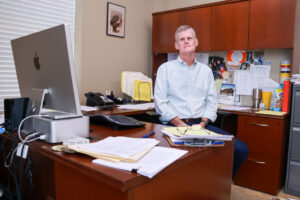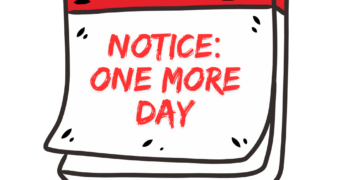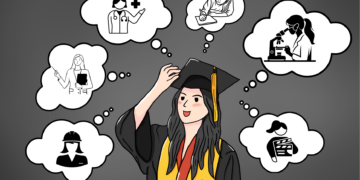Political science and public policy leadership professors at the University of Mississippi are seizing the opportunity to teach through what many are calling one of the most consequential elections in U.S. history.
Jonathan Windburn, a political science professor, said he has reoriented his Introduction to American Politics class to focus on this year’s election.
“In my 101 class, I’m spending election week really focusing directly on the Tuesday Election Day, and then Thursday (I will do) sort of a whole day talking about what happened on Tuesday,” Windburn said. “So in that way, it’s more election-focused material in the course than I would normally cover in an intro class.”
Windburn said that teaching through the election has been particularly interesting.
“It is always more interesting to teach during an election year because there (are) just more things going on,” Windburn said. “And people actually pay attention to the presidential election, so sometimes students are more engaged, not always, but sometimes they get more involved and pay attention.”
Sue Ann Skipworth, who also teaches Introduction to American Politics, said her class has been particularly engaged in this year’s election.
“We’re going to draw attention to what’s going on in the election season,” Skipworth said. “For example, (my) Introduction to American Politics class was asked throughout the semester to pick out articles or stories in the media that followed the election cycle. They relate to what’s going on in the articles, talk about what they are studying, and then they also give their own opinion or story.”
Skipworth said that although elections are typically a part of her curriculum, conversations in the classroom have been more intentional this year.
“While I always have a segment in my Introduction American Politics course on elections, in general, the topic becomes more pronounced during a presidential election year simply because we are seeing the election play out in real time,” Skipworth said, “I try to offer greater opportunities for students to talk or ask questions about what they are seeing or reading in the media and hear their thoughts or feelings pertaining to the entire election process.”
Skipworth said online discussion boards have become an outlet for students to discuss their opinions.
“I certainly enjoy reading what they’re writing on their (discussion) posts and getting an idea of where they are coming from,” Skipworth said. “Sometimes in a face-to-face class it’s harder to get students to tell me what they’re thinking, but in the online class they are writing it out and have time to think about it before they write it down and really perfect what they’re wanting to say.”

Chair and Professor of Public Policy Leadership Weixing Chen found that the election has prompted more in-depth class discussions, especially around international policy.
“I think it’s good in the sense that issues that have been ignored and neglected are getting paid more attention to this cycle,” Chen said. “Also the election year cycle provides new subjects, new topics, debates and discussions for the class.”
However, not all professors are integrating the election into their courses. Political science professor Miles Armaly, who also teaches Constitutional Law I, does not discuss the election in his class.
“Given that the election is not particularly germane to the topic in POL 306, it has not changed how I approach the topic,” Armaly said. “If the discussion were germane to constitutional law, I would absolutely allow it to continue.”
Kaley LeCroy, a junior public policy leadership major, said her ethics class has enabled students to apply theoretical concepts to real-world events.
“We are able to watch the debates that are going on and kind of apply some of those things that we’re learning and to look out for them,” Lecroy said. “People are a lot more engaged. It’s much easier to draw the line between the real world and concepts, rather than when there’s not an election year going on.”
Political Science Department Chair John Bruce expressed concern about the rise of misinformation and its impact on contemporary politics.
“It’s hard to have a conversation where you’re actually talking about the situation because now it’s like this is the truth for these people, and this is (a different) truth for these people,” Bruce said. “And that’s just insanity.”


























